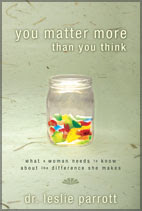Week 7 – You Matter More Than You Think
 Whisper test, too late?, anyway (32 pages)
Whisper test, too late?, anyway (32 pages)I am SO very late getting this out to you guys and I am deeply sorry. There are a ton of excuses, but the fact of the matter is that this is truly a great book and it needs to be shared and experienced as a group. Don’t you think? I can’t tell you how many underlines and highlights I have and notes that I have written to myself just from reading it.
I hope you are enjoying it as much as I am and are taking lots of notes as well. Let’s get going and start working on the highlights, shall we?
Chapter 15 – whisper test
“Let no one ever come to you without leaving better and happier.” ~Mother Teresa
Page 165 – The word “care” comes from the German kar, which originally meant “sad”. The word alludes to the idea that a caring person feels sad when you feel sad. Care is a kind of compassion that allows a person to enter your world and feel your pain.
Page 165 – When we truly care for another person at a deep and meaningful level, we involve both our heart and our head. We think their thoughts and feel their emotions. When we care, we pay close attention to another person’s experience. We listen and watch for ways to be helpful. We take notice and attend to someone else’s world as if it were our own.
“You’re blessed when you care. At the moment of being “care-full,” you find yourselves cared for.” ~Matthew 5:7, MSG
Page 170 – Is there anything more valuable than a caring friend – someone who knows what you need and lavishes you with love? Someone who hurts when you hurt? Someone who is willing to enter your world in order to say or do just the right thing? This is what caring enables you to do…Don’t you long to be the kind of person who cares deeply? I know I do.
Ponder…
1) What “little things” have others done that have made a significant impact on you? Why?
2) Reflect on your life. In what ways are you already making a difference – in the little things?
3) Find a quiet moment to “walk along the shore” (Whether literally or figuratively). What little thing is your heart telling you to do, out of love?
Chapter 16 – too late?
“It’s never too late to be what you could have been.” George Eliot (pseudonym of Mary Ann Evans)
Page 180 – It turns out, ultimately, that I didn’t miss my chance to make a difference. And chances are, you haven’t either. You may not have a family fissure, but if you are like most of us, you have a relational loose end that needs some mending. Or perhaps you closed the door too soon on an opportunity to do some good.
What tugs at your heart when you read these words? Are you putting off a difference-making opportunity because you fear you’ve missed your chance, because too much time has elapsed? Don’t allow the passage of time to steal a difference-making opportunity from you.
Ponder…
1) Have you ever put a reconciliation on hold for too long? Ever contented yourself by saying “eventually I’ll make it better”? If so, be specific and consider what might have happened for you as well as for the other person if you hadn’t put it on hold for so long? What can you learn from that?
2) If you currently have a reconciliation on hold, do you think you’re ready to remedy it? Why or why not? If you are thinking it’s too late, do you think that’s what the other person would say if you made the move in that direction?
Chapter 17 – anyway
Page 184 – But my safety has more to do with my emotions. For example, it has to do with protecting myself from receiving a critical comment (What if I offend someone?), even if that means sacrificing an attempt to make a positive difference. It has to do with not risking loving action for fear of failing (What if they resist my love or feel pitied?). So I play it safe. Do you ever feel this way?
(Seriously…could she be reading my mind…does this happen to any of you too?)
Page 186 – Whenever I stop hiding, when I move out of the hard shell of my comfort zone and cast off my insecurity, that’s when I’m most free to find a path where I can make a difference. You and I both do this whenever we reach out in love to another person – regardless of what others think. We do this when we boldly speak out in love – even if this might incur criticism. We do this when we care deeply for another by giving of ourselves – despite the fact that our love may be rejected or we might feel like we have failed.
(Oh.My.Gosh…can we all stop for a minute on this and really let it sink in…’cause I don’t know about you, but she is speaking straight to me on this one)
Page 188 – Making a difference isn’t about playing it safe. It’s about moving out of our comfort zone and boldly loving other people. It’s about the vulnerability of risking rejection. And of risking failure. If we aren’t willing to risk, if we play it too safe, we diminish our difference-making capacity.
“You may be disappointed if you fail, but you are doomed if you don’t try.” ~Beverly Sills
Page 190 – I can stay cooped up in my comfort zone for longer than I care to admit. Do you ever play it safe? Isn’t it easy? It’s the surest way I know of to avoid potential criticism. And nothing sends me scampering back into my comfort zone like criticism – especially after a risky attempt to make a difference. I think it’s the deadliest dart ever thrown at a woman’s good intentions. And yet, no matter how hard you work, how great yuour ideas, or how wonderful your talent, you will be the object of criticism. No one is exempt. Even the perfect motives of Jesus were misunderstood and criticized.
Page 194 – And talk to another woman whom you’ve seen move out of her comfort zone. Amazing strength can be found in seeing this character quality modeled in a woman you know. Reach out to her and let her know you admire her for it. Even as you read these words, a specific woman may have come to your mind. Why not write her a note? Take her to coffee? If this sounds too risky…well, then you simply must do it anyway.
Ponder…
1) Speaking personally, what seems to get in your way of making a difference? Do you tend to play it safe and give control to critics? If so, in what specific ways does this happen in your life?
2) We all have our “comfort zones.” Consider a time when you’ve taken a risk, when you stepped beyond what made you feel comfortable for the benefit of someone else. What good came from this? What was the outcome, and how would you rate your level of fulfillment because of it?
3) When you read the Paradoxical Commandments (YOU MUST READ THESE THEY ARE AWESOME, ~Melissa) how do you feel? Consider each of them and ask yourself if you can practice the “anyway” principle. Give some examples of how you have done just that and how it made a difference in somebody’s life.
I hope you have been taking notes, reading along, and sharing what you are learning with others. There is hope in knowing that we can make a difference and if each of us would start to share this principle with one of our friends, and they shared it, and so on, then we really could start making a difference in how we look at our lives and what we do.
I don’t care if you work, stay home, work at home, have kids, don’t have kids, married, single, divorced, widowed…you do, each and every one of you, make a difference and if we all can grab a hold of that we would all be so much better for it!
Come back next Wednesday, June 18th as we discuss the interlude, compassionate witnesses, and only seeds (21 pages). We are only two more discussions away from finishing the book…
PS – Click here to put your name in the hat for the Mel’s World Summer Give Aways…the drawing is NEXT Thursday, June 19th at 5pm.


I haven’t been reading along, but the excerpts you’ve been posting are really making me think. Thank you.
Wow! That is good. I am a person who tends to help others and give myslef to whatever someone needs. My family that does not know God knows that I am different, but they are just strange and complicated. Had a friend, so I thought, because she is mourning she decides to not be a friend. Weird but I understand too. I would not have changed helping her out in any way even if I knew that was going to happen.